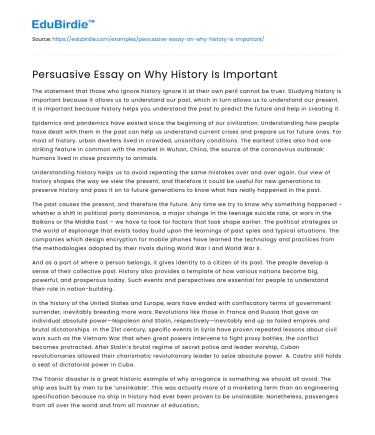The statement that those who ignore history ignore it at their own peril cannot be truer. Studying history is important because it allows us to understand our past, which in turn allows us to understand our present. It is important because history helps you understand the past to predict the future and help in creating it.
Epidemics and pandemics have existed since the beginning of our civilization. Understanding how people have dealt with them in the past can help us understand current crises and prepare us for future ones. For most of history, urban dwellers lived in crowded, unsanitary conditions. The earliest cities also had one striking feature in common with the market in Wuhan, China, the source of the coronavirus outbreak: humans lived in close proximity to animals.
Save your time!
We can take care of your essay
- Proper editing and formatting
- Free revision, title page, and bibliography
- Flexible prices and money-back guarantee
Understanding history helps us to avoid repeating the same mistakes over and over again. Our view of history shapes the way we view the present, and therefore it could be useful for new generations to preserve history and pass it on to future generations to know what has really happened in the past.
The past causes the present, and therefore the future. Any time we try to know why something happened – whether a shift in political party dominance, a major change in the teenage suicide rate, or wars in the Balkans or the Middle East – we have to look for factors that took shape earlier. The political strategies or the world of espionage that exists today build upon the learnings of past spies and typical situations. The companies which design encryption for mobile phones have learned the technology and practices from the methodologies adopted by their rivals during World War I and World War II.
And as a part of where a person belongs, it gives identity to a citizen of its past. The people develop a sense of their collective past. History also provides a template of how various nations become big, powerful, and prosperous today. Such events and perspectives are essential for people to understand their role in nation-building.
In the history of the United States and Europe, wars have ended with confiscatory terms of government surrender, inevitably breeding more wars. Revolutions like those in France and Russia that gave an individual absolute power—Napoleon and Stalin, respectively—inevitably end up as failed empires and brutal dictatorships. In the 21st century, specific events in Syria have proven repeated lessons about civil wars such as the Vietnam War that when great powers intervene to fight proxy battles, the conflict becomes protracted. After Stalin’s brutal regime of secret police and leader worship, Cuban revolutionaries allowed their charismatic revolutionary leader to seize absolute power. A. Castro still holds a seat of dictatorial power in Cuba.
The Titanic disaster is a great historic example of why arrogance is something we should all avoid. The ship was built by men to be ‘unsinkable’. This was actually more of a marketing term than an engineering specification because no ship in history had ever been proven to be unsinkable. Nonetheless, passengers from all over the world and from all manner of education, class, and color eagerly booked passage on the grandest ship ever built. Around midnight of April 14, 1912, the ship struck an iceberg in the North Atlantic Ocean and sank, in spite of all the marketing promises to the contrary. Here’s where arrogance compounds the disaster. The White Star Line, the owners of the ship, in their wisdom and utter conceit, decided that lifeboats weren’t all that useful on a ship that couldn’t be sunk. They had a few but not nearly enough to save more than 2000 people who had put their lives on the line by boarding this epic failure. This point remains the only real lesson mankind learned from the Titanic disaster; all ships are now required to carry enough lifeboats for everybody on board and no marketing department has ever used the word unsinkable again. 1500 people lost their lives before we learned the real danger of arrogance.
It may be common sense that all of the good things and all of the bad things about people, and the way that we organize ourselves, are simply going to breed patterns as we continue to make history as a species. It may be that we are simply given to a certain irrationality that leads us down paths, some disastrous, again and again.
Hence, history shows us a mirror of the future and encourages us to learn from it and implement it in our lives, which is why it is so important.






 Stuck on your essay?
Stuck on your essay?

